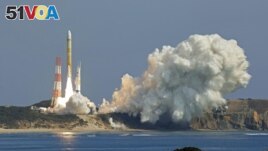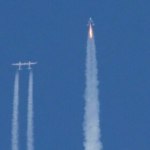07 March 2023
Japan's space agency had to destroy a rocket after a launch Tuesday because its second stage engine failed to start.
The 60-meter-tall rocket is called the H3. It is Japan's first new rocket in more than 20 years.
The misfire was the second rocket problem for the agency in the last three weeks.

An H3 rocket carrying a land observation satellite lifts off from the launching pad at Tanegashima Space Center on the southwestern island of Tanegashima, Kagoshima Prefecture, southwestern Japan March 7, 2023. (Kyodo via REUTERS)
The H3 rocket blasted off from a launch area at the Tanegashima Space Center on an island in southern Japan. However, a problem happened in the rocket's second stage. The Japan Aerospace Exploration Agency explained that the ignition for the second stage failed, and the rocket would not have made it into orbit.
The agency, known as JAXA, said it destroyed the rocket 14 minutes into its flight because it could not continue.
Yasuhiro Funo is the JAXA launch director. He said the rocket was unsafe at that point and had to be destroyed. It fell into the sea off the eastern coast of the Philippines.
The rocket carried an Earth observation satellite called ALOS-3. It included a special infrared sensor that could follow military activity such as missile launches.
JAXA also had a problem six months ago with a different kind of rocket.
The H3 rocket launch had a two-year delay because of an engine problem. JAXA leaders said more study is needed to prevent future problems.
Hiroshi Yamakawa is JAXA's President. He said his agency needs to "figure out what we should do to successfully achieve the next launch."
JAXA spent over $1 billion on the H3, the agency's first new rocket in 22 years. It follows the H-2A, which will no longer be used after its upcoming 50th launch. The H3 rocket is smaller but can carry larger loads and is less costly per launch.
Hirotaka Watanabe is a professor at Osaka University. He studies space policy. He spoke with Reuters about the future.
"This will have a serious impact on Japan's future space policy, space business and technological competitiveness," he said.
I'm Dan Friedell.
Dan Friedell adapted this story for VOA Learning English based on reports by the Associated Press and Reuters.
______
Words in This Story
stage –n. a section of a rocket that has its own fuel and engine
ignition –n. the electrical system that causes a fuel to burn
sensor –n. a device that identifies the presences of force or electromagnetic radiation and reacts to it in a defined way
achieve –v. to do something, to make something happen
figure out –v. to find something out by thinking










